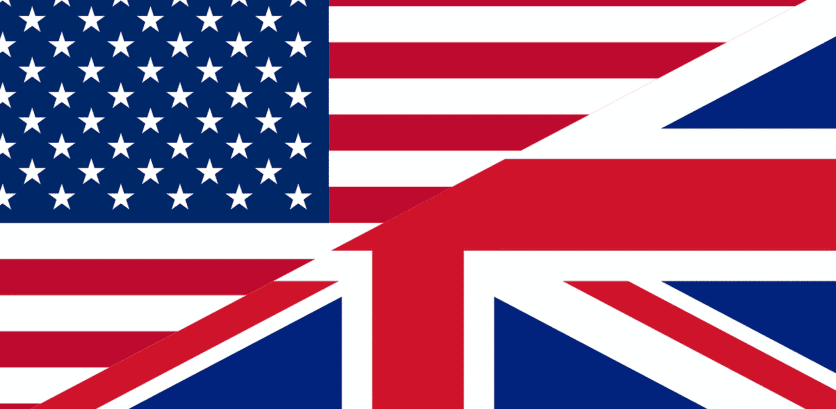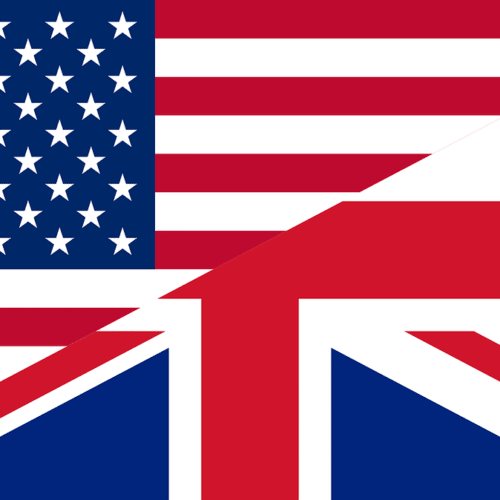Two nations divided by a common language. You say potayto and I say potahto. Let’s call the whole thing off or let’s call the calling off, off—dealing with the puzzle of British and American English.
Ian is a British journalist and editor, based in Yorkshire with a deep interest in words, culture, data and how people talk to each other. He has a cat called Susan and rows on the River Aire.
Do you speak English?
When my close friends moved to California from the UK back in the Nineties for a job in Palo Alto, they enrolled their eldest child, Sophie, in a private school in Santa Monica.
At the first meeting with the school’s principal (note: in the UK, a principal is called a head teacher) to discuss Sophie’s induction into the US education system, the principal asked, “So, you’re British? Does Sophie speak English?”
Think about that for a moment: does this child, brought up in Britain from birth, the home of William Shakespeare, Wordsworth and Lord Byron (look them up) speak English?
My family and I visited them not long after. One day, while out shopping my wife, with her cut-glass English accent, was asked by the shop assistant (note: in the US, a shop is called a store) where she was from. “England,” my wife replied. Puzzled, the shop assistant asked, “Where’s that?”
Two nations divided by a common language
A brief history lesson for you. By 1650, England—and it was just England as the nations of England, Scotland and Wales had not been truly unified into the UK at this point in history—had established a dominant presence on the US Atlantic coast and introduced English as the leading language to the colonies of America.
At that time, spelling had not yet been standardised. It took the writing of the first dictionaries to set in stone how these words appeared. In the UK, the dictionary was compiled by London-based scholars like Samuel Johnston.
Meanwhile, in the US, the lexicographer Noah Webster changed how the words were spelled to make the American version different from the British as a way of showing cultural independence from the mother country after the War of Independence.
To this day, people in the UK and the US struggle with the conundrum of why American isn’t English and English isn’t American. We are two nations divided by a common language.
Rubber versus eraser
For instance, if I went into a stationers (stationery shop) in the UK and asked for a rubber, I would be given an eraser to amend my pencil scribbles. In the US, I would be directed to the drugstore (note: a drugstore in the UK is called a chemist’s) where they would offer me a condom which isn’t much good for erasing anything. Oh, wait a minute. I didn’t think that through.
And it’s not just vocabulary. Another puzzle between British and American English is pronunciation. When the first settlers arrived in the US, they spoke rhotic speech where the ‘r’ sounds of words are pronounced. Meanwhile, back in England, the snobby upper classes wanted to distinguish the way they spoke from the common masses by softening their pronunciation of the ‘r’ sounds.
Since the elite—given Britain’s class-ridden culture—laid down the standard for what was considered proper, other people began to copy their speech until it eventually became what we Brits called received pronunciation (RI) and the acceptable dialect of a respectable person in England. As a Scouser from Liverpool, I didn’t do RI growing up.
Check your splelling
These divisions remain to this day. Consider spelling. The spell check function in Microsoft Word offers two options – English (United Kingdom) or English (United States) – and the two don’t match up.
The common ones are presented below.
| British English | American English |
| -oe-/-ae- (e.g. anaemia, diarrhoea, encyclopaedia) | -e- (e.g. anemia, diarrhea, encyclopedia) |
| -t (e.g. burnt, dreamt, leapt) | ed (e.g. burned, dreamed, leaped) |
| -ence (e.g. defence, offence, licence) | -ense (defense, offense, license) |
| -ell- (e.g. cancelled, jeweller, marvellous) | -el- (e.g. canceled, jeweler, marvelous) |
| -isle (e.g. appetiser, familiarise, organise) | -ire (e.g. appetizer, familiarize, organize) |
| -l- (e.g. enrol, fulfil, skilful) | -ill- (e.g. enrols, fulfill, skillfull) |
| -ogue (e.g. analogue, monologue, catalogue) | -og (e.g. analog, monolog, catalog) |
| -ou (e.g. colour, behaviour, mould) | -o (e.g. color, behavior, mold) |
| -re (e.g. metre, fibre, centre) | -er (e.g. meter, fiber, center) |
| -y- (e.g. tyre) | -i- (e.g. tire) |
US spelling is an affront to the English eye particularly the substitution of ‘z’ for ‘s’ for words that end in -ise, but I expect the average American does not give a damn (a word that has a common meaning in British and American English).
Your pants are my trousers
Meanwhile, there are words which just do not match up. For potato, Brits say potahto and Yanks say potayto, but it goes further than that. The Americans and the British also have some words that differ from each other. Consider the following:
| British English | American English |
| trousers | pants |
| flat | apartment |
| bonnet (front of a car covering the engine) | hood |
| boot (i.e. the place you put your luggage) | trunk |
| lorry | truck |
| university | college |
| holiday | vacation |
| jumper | sweater |
| crisps | chips |
| chips | French fries |
| trainers | sneakers |
| fizzy drink | soda |
| post box | mailbox |
| biscuit | cookie |
| chemist | drugstore |
| shop | store |
| football | soccer |
For Brits, who codified the rules of association football, soccer is an abomination. Finally, there is the grammar. Neither Brits nor Yanks really use grammar as most Europeans would—no gender words for us. And why would you allocate a gender (male, female or neutral) to a teapot for goodness sake?
We don’t do grammar
But Brits and Yanks also cannot agree on grammar conventions. For instance, in American English, collective nouns are considered singular (e.g. the band is playing). In contrast, collective nouns can be either singular or plural in British English, although the plural form is most often used (e.g. the band are playing).
The British are also more likely to use formal speech such as shall whereas Americans favour the more informal will or should. Americans, however, continue to use gotten as the past participle of get which the British have long since dropped in favour of got.
Needn’t, which is commonly used in British English, is rarely, if at all, used in American English. In its place is don’t need to. In British English, at is the preposition in relation to time and place. However, in American English, on is used instead of the former and in for the latter.
Are you confused? Me too!
Are you confused by all this? Me too. But don’t worry, we Brits and Americans muddle along—after all we have a special relationship—and can work our way through the linguistic minefield that is the Atlantic Ocean. Just be lucid in your writing, and we can work it out. But, please don’t ask for a rubber at a US stationers.

